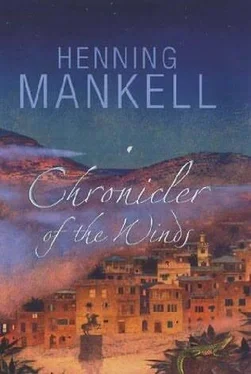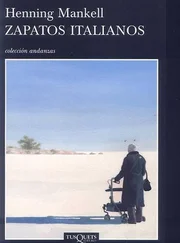If Mandioca was tall and carried earth around in his pockets, then Nascimento was his complete opposite: short and stocky, with stones and sharp iron-points stuck in his hair and in the frayed edges of his tattered clothing. Nascimento woke up screaming every night; he saw contorted monsters coming towards him out of the dark. The others who slept around him on the cardboard boxes under ragged blankets had grown used to being woken each night. They took turns telling Nascimento that there were no monsters, there were no bandits, there was only the deserted city and the cardboard boxes and the ragged blankets. In the daytime, when it was light, Nascimento continued to chase his monsters. Then they became his fear of the night that would inevitably come, the endless series of nights and monsters that he would continue to battle as long as he lived.
He never uttered an unnecessary word. He wore a pink swimming cap pulled all the way down to his eyes, and he always expected that whoever he met meant him harm. That's why he defended himself by going on the offensive. He fought with everyone and everything: with the rusting and broken-down cars, with the rubbish bins, with rats and dogs and cats, and with the others in the group. Sometimes he would even lose control and go after Cosmos, who of course was much stronger and who would be forced to dip Nascimento's head into the broken sewer pipe behind the garage where the thieves from the suburbs ordered the new licence plates they needed for the cars they stole during the night.
Nascimento had a secret that no one knew anything about; he was hardly aware of it himself. One time when he found a half-full bottle of wine and drank it down in one gulp, he was overcome by an intoxication that seemed to make him reveal at least part of the truth. And Nelio, who was the one he confided in, gradually understood from his stuttered, incoherent and poorly formulated sentences that Nascimento had once been forced to do what Nelio had managed to escape: he had killed someone in order to save his own life. Nelio understood that Nascimento had been forced to kill his own father with a cudgel or an axe, and that he had then become one of the feared child-soldiers that the bandits always sent in advance whenever they were going to attack a village or a bus or people working in their fields. How he had ended up in the city, nobody knew. But he had not arrived alone; from the very beginning he had brought along his swimming cap and his invisible companions, the monsters who never ceased to torment him.
Pecado did not have imaginary monsters; he had real-life monsters, out in one of the suburbs. His father had disappeared without a trace. Pecado seemed only able to remember that his father had laughed when he left the hovel where they lived, never to return. His father was a faceless laughter. There were seven children. His mother sold vegetables at the marketplace. She would get up at four in the morning and walk over to the decrepit old bullring where she could buy produce cheaply. Then she would carry her baskets to the marketplace, and she wouldn't come back home until it was dark. Pecado never saw her laugh. But he didn't remember her being sad either, only worn out, exhausted and dejected. If his father was a faceless laughter, his mother was a face in which all contours had been worn away; her nose had crumbled, along with her eyes, her teeth and the smile which once must have existed.
One day a new man entered their house. Everything was supposed to be fine: a new husband, a father who would sit in the shade and shout for food. Pecado began hating the man the minute he saw him step across the threshold; he didn't want any padrasto. And the man seemed to have read his thoughts, because he announced his presence by knocking Pecado to the ground and twisting one of his shoulders out of its socket. Then he hit each of Pecado's siblings in turn. He devoted his days to beating them while their mother was out on her endless wandering with the baskets of vegetables, which kept them alive. Finally Pecado had had enough. He decided to live up to his name, and he heaved a roof tile at the head of the man who had moved into his mother's bed. He threw it with all the strength of his siblings gathered in his fists; he was six years old at the time. Then he fled to the streets, because nothing could be worse than being at home. During those first years he hoped that his mother would try to find him. But she never came. He saw her only from a distance, when she stood at her stall selling alface and sometimes tomatoes. Pecado never went back home, and in the end his mother had become as vague and remote a memory as his father with the faceless laughter.
Then there was Alfredo Bomba, the youngest, who had only one arm. He had been born a pariah with a stunted shoulder in another town, and he came with an older brother to the big city to seek, if not happiness, then at least less misery. He was the one who constantly hid behind an unwavering good humour except when he begged – then he would cry, and he knew all the tricks. He was missing an arm, but he could make those who saw him believe that he was missing everything. They saw only his hand stretched out, and they gave him money for their own salvation. He was the one who each day could give Cosmos the greatest amount of money; it was his mission in life. He bore with joy and pride the fact that he was always the one who could contribute the most.
At his side almost always was Tristeza, the slow-witted boy. He was the hopeless stepchild of poverty; his brain had never been given the nutrition it needed as much as it needed oxygen. He had never learned to think except very slowly. For his mother, he was the twelfth painful reminder that she was still alive, and after naming the eleventh child Miseria, she had had only one name left; Tristeza. And she died the same day that he was born after having whispered to an exhausted and starving nurse that she wanted his name to be Tristeza, the only thing that she had left.
Nelio listened in amazement to their stories, and he realised that he was one of them; they had the same origins and the same experiences. In their stories he recognised himself, in the way that they all carried the burned village inside them. Often, as he lay in the horse's belly waiting for sleep, he would think that they all seemed to have been born of the same mother. A woman who was young and full of energy, but who had been broken by bandits, by monsters and by poverty to become a toothless, shrunken shadow. He knew that this was what they actually had in common: possessing nothing, having been born into a world against their will, and having been flung out into a misery created by bandits and monsters.
They had only one mission in life: to survive.
In the daytime he would see the rich climbing in and out of their shiny cars on the wide avenues in the centre of the city: white men, black men, Indians. From Cosmos he had learned what one of those cars cost. It was such a dizzying sum that it was as if Cosmos were talking about the distance to a star rather than the price of a car. By looking at the rich, Nelio also discovered his own poverty. Between the rich, who always seemed to be setting off to conduct some urgent business, and the group of street kids there was a chasm which Nelio saw widening every day. The kids would cross it whenever they popped up and offered to watch over a car or to wash it while the black or white or Indian man who stepped out with his briefcase was conducting his important business.
Nelio once asked Cosmos who these men were, what they had in their briefcases, and why they were always in such a hurry. Cosmos didn't have any answers, but admitted that it might be worthwhile to find out. At an advantageous moment a short time later, he instructed Mandioca and Tristeza to break into a car and steal the briefcase that was inside. Afterwards they took cover behind the petrol station and opened the bag. Mandioca had imagined it full of money. But when he opened the lock and lifted the flap he found only the shrivelled remains of a lizard. That was a magic moment, since they would never have imagined that a dead lizard could be the secret of great riches.
Читать дальше












